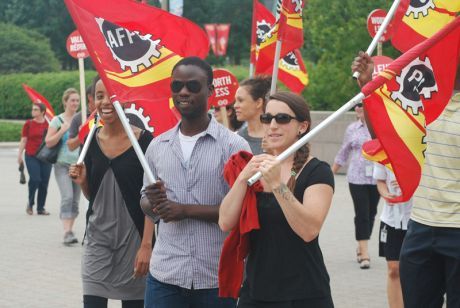Features
You are here
Stop Harper’s war on workers

November 17, 2013
Last year Harper declared war on climate justice with omnibus bill C-45, and this year he is declaring war on workers with omnibus bill C-4.
In what appears to be its final move to take off the gloves, bill C-4 contains 300 pages of sweeping changes to working conditions and collective bargaining at the federal level—taking aim at the labour movement that is central in the fight against austerity. These changes can be expected to set the tone for labour relations at other levels of government and in the private sector.
Already earlier this year, the government signalled its intentions when it announced that it hopes to overhaul the benefits package for federal public service workers, starting with sick leave. In C-4, Harper and Finance Minister Jim Flaherty are laying the ground for a full frontal assault on the health and safety of federal public service members, simultaneously undermining fundamentals of collective bargaining and removing the traditional mechanisms for workers to resist.
Public sector workers
There are 18 bargaining agents at the federal level, but three main unions dominate: the Public Service Alliance of Canada (PSAC), the Professional Institute of the Public Service (PIPSC), and the Canadian Association of Professional Employees (CAPE). Of these, the PSAC is largest with over 170,000 members, most working for the federal government; PIPSC is second, with 60,000 members. CAPE represents 13,000 federal government workers.
Federal labour legislation allows for unions to decide, before bargaining commences, whether they want to go to binding arbitration if negotiations fail, or take the “conciliation/strike route.” The take-up on the conciliation/strike approach has been very partial. Most of the public sector bargaining has typically taken place by way of arbitration, by choice of the union.
That process means that federal public sector workers generally have very little or no experience of mobilization, either in support of bargaining, or to take job action. The fact that workers’ only real power lies in withdrawing their labour has been laid by the wayside, yielding to a regime in which the first union to the table is the most militant, whether they are so in reality or not, and the others sign essentially the same deal, falling over like dominoes.
Bill C-4
That’s where bill C-4 comes in. The bill contains changes to the labour code that will see the Government gain essentially unilateral power to designate workers as performing essential services, thereby removing their right to strike. Currently, essential work is negotiated by the two sides at the beginning of bargaining. Under the new bill the government can make this declaration at any time, seemingly even during a strike that has already begun. This change will have a significant impact on the mobilization capacity of PSAC locals in particular, since they are the most willing to use the conciliation/strike route.
But with the other hand, the government is changing the process by which unions can choose to use binding arbitration. To take that route now requires agreement by both sides. This means that unions with no mobilizing capacity and no strike fund could be forced to either accept what Treasury Board offers, try to go on strike from a position of basic weakness, or be locked out by the government with the same result.
These changes attack both unions willing to take strike votes, and those who have not struck in over 30 years. If PSAC were to wage a strike, it could be weakened by the first measure, leaving no possibility of lending strength to weaker unions.
The arbitration system is also being significantly weakened, with new restraints on what an arbitrator can take into account in ruling.
Aside from these attacks on collective bargaining, workers rights to grieve are significantly eroded as well, making policy grievances nearly impossible, pointless, and prohibitively expensive. Federal public service workers will also lose the right to argue most discrimination and harassment complaints against their employers with the Human Rights Commission, forcing them instead to argue those complaints solely at the Public Service Labour Relations Board.
Finally, the changes are also a direct attack on health and safety, fundamentally eroding the right to refuse dangerous work through a redefinition of what constitutes ‘danger.’ These attacks are not only aimed at gutting sick leave; they are a full frontal attack on collective bargaining and the few achievements not yet eroded in the federal public sector.
Idle No More
Bill C-4 is part of a pattern of attacks on labour around the globe. With other federal bills recently tabled to attack unions, and provincial government openly contemplating attacking the Rand formula—like Hudak’s threat of “right to work” in Ontario—the situation is ever more urgent.
Local and regional organizing in all three unions has escalated dramatically over the past several weeks. The reality is that it may turn out to be too late to stop the next onslaught. But a new generation of public service employees has been joining the ranks, and the ground must be laid now, not only for next year’s round of collective bargaining, but the future of unions in Canada.
In response to last year’s bill C-45, the Idle No More movement emerged to fight for indigenous sovereignty and climate justice, leading the fight against Harper. In response to Bill C-4 and other attacks on workers, we need to build a fighting labour movement.
Section:









